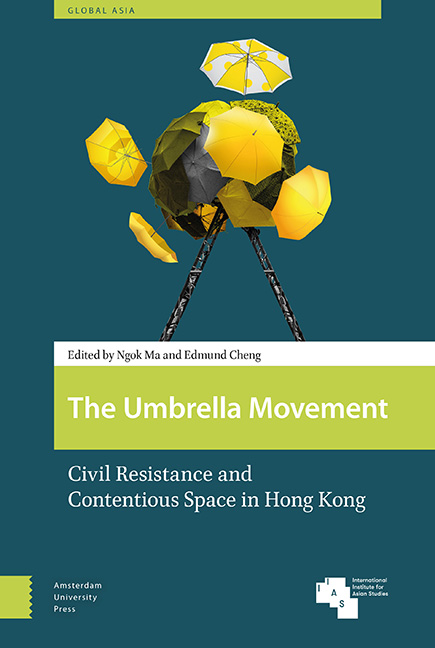Book contents
- Frontmatter
- Contents
- Acknowledgements
- Introduction: Civil Resistance and Contentious Space in Hong Kong
- Part A Trajectory and Contingency
- Part B Repertories and Strategies
- Part C Regime and Public Responses
- Part D Comparative Perspectives
- Appendix: The Umbrella Movement—Chronology of Major Events
- Index
- Publications/Global Asia
1 - From Political Acquiescence to Civil Disobedience: Hong Kong's Road to Occupation
Published online by Cambridge University Press: 21 November 2020
- Frontmatter
- Contents
- Acknowledgements
- Introduction: Civil Resistance and Contentious Space in Hong Kong
- Part A Trajectory and Contingency
- Part B Repertories and Strategies
- Part C Regime and Public Responses
- Part D Comparative Perspectives
- Appendix: The Umbrella Movement—Chronology of Major Events
- Index
- Publications/Global Asia
Summary
Abstract
The outbreak of the Umbrella Movement in 2014 followed decades of futility in the democracy movement. Years of conventional protests and bargaining had failed to bring about full democracy for Hong Kong. The rise of a new political identity and trends of radicalization in social and political movements fuelled the massive civil disobedience campaign. With Beijing handing down an election formula that allowed popular elections only after a Beijing-controlled committee screened the candidates, the opposition was prepared to launch an occupation campaign. Police violence then triggered the spontaneous participation of the masses, culminating in the 79-day occupation that signified a new stage of contentious movements for Hong Kong.
Keywords: Umbrella Movement, Hong Kong democracy, civil disobedience, political identity, social movements, China-Hong Kong relations
Introduction
The outbreak of the Umbrella Movement in September 2014 was a result of the futility of decades of democratic struggle in Hong Kong. It also marked a major turning point in the direction of social movements in Hong Kong, as large numbers of activists opted to undertake direct action and civil disobedience in defiance of police power and possible prosecution. This followed the rise of a new political identity among the younger generation, who were determined to have more say in their political future, as well as a more general trend towards radicalization in local movements.
This chapter discusses the social and democracy movements in Hong Kong over the last 40 years to put the Umbrella Movement into perspective. Decades of fruitless struggles for democracy drove Hong Kong's people onto the road of civil disobedience. The Umbrella Movement was also sparked by a new generation of activists who are more efficacious and empowered. This chapter provides a background for readers unfamiliar with the political history of Hong Kong, to help in understanding the 2014 Umbrella Movement.
Politics in Postwar Hong Kong
The dominant narrative concerning the political situation of early postwar Hong Kong describes an apolitical population facing a non-interventionist government. Siu-kai Lau's famous “minimally-integrated socio-political system” formulation posited that postwar Hong Kong was a refugee society, with most inhabitants settling in Hong Kong after fleeing communist rule (1984).
- Type
- Chapter
- Information
- Umbrella MovementCivil Resistance and Contentious Space in Hong Kong, pp. 27 - 50Publisher: Amsterdam University PressPrint publication year: 2019
- 1
- Cited by



